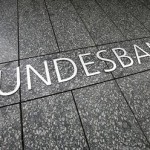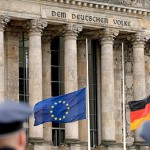German Business Confidence Declines as Economy Seen Slowing

German business confidence declined more than economists forecast amid signs that growth in the euro area’s largest economy will slow this quarter.
The Ifo institute’s business climate index, based on a survey of 7,000 executives, fell to 110.4 in May from 111.2 the prior month. Economists predicted a drop to 110.9, according to the median of 38 estimates in a Bloomberg News survey.
Germany is key to the recovery in the 18-nation euro area, which is struggling to pick up pace amid near-record unemployment and subdued pricing power. Data today showed German economic growth was driven exclusively by domestic demand in the first three months of the year, and the Bundesbank has said the expansion will cool this quarter.
“It seems as if the German business climate has reached a plateau, as further impetus for growth is missing,” said Johannes Gareis, an economist at Natixis in Frankfurt. “Despite this setback, there is no reason to start worrying about the German economic outlook.”
A measure of current conditions unexpectedly declined, dropping to 114.8 in May from 115.3 the prior month, the Ifo report showed. A gauge of expectations slid to 106.2, the lowest reading since October.
The euro weakened as much as a third of a cent after the report, and traded at $1.3622 at 12:22 p.m. Frankfurt time.
ECB Policy
Reports yesterday by Markit Economics showed the divergence in the currency bloc. Manufacturing and services in France, the region’s second-biggest economy, both shrank this month, while a composite index of the industries in Germany held at 56.1, indicating growth at close to the fastest pace in three years.
European Central Bank President Mario Draghi will ease monetary policy on June 5 to counter the risk of too-low inflation, according to 90 percent of economists in the Bloomberg Monthly survey. Measures could range from a negative deposit rate to liquidity injections or an asset-purchase plan. Euro-area inflation has been stuck at less than half the ECB’s goal of just under 2 percent since October.
Policy makers last met on May 8, when they kept the benchmark interest rate at a record-low 0.25 percent and the deposit rate at zero.
The German economy expanded 0.8 percent in the first quarter as a mild winter boosted construction and private spending picked up, the Federal Statistics Office said today. Net international trade dragged on growth as imports outpaced exports.
Euro-Area Growth
The Bundesbank has said any slowdown this quarter as the effect of the mild winter recedes “should not be interpreted as a decline in the basic speed of the economy.”
Even so, any pull-back would be a drag on the euro-area economy, which expanded just 0.2 percent in the first quarter, with France stalling and renewed contractions in Italy, the Netherlands and Portugal. Car sales in Germany dropped in April, contributing to the weakest growth in European auto registrations in five months.
“The German economy will not accelerate beyond the impressive speed it has reached already,” said Holger Schmieding, chief economist at Berenberg Bank in London. “Do we have to worry about this? No, we probably don’t.”
Source: bloomberg





























